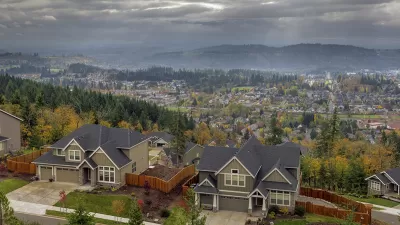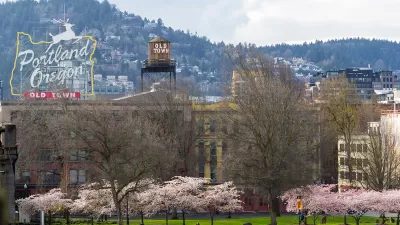Portland is expecting 123,000 new households in the city by 2035, so it's proposed a new residential infill policy to accommodate all those people. A new report argues, however, that the policy could have a chilling effect on infill development.

"The city of Portland is considering whether to change zoning rules to create more room to build affordable housing and accommodate future growth, according to an article by Kieran Hanrahan.
"Portland’s Residential Infill Project would change residential zones that only allow single-family homes to allow duplexes and triplexes," explains Hanrahan, who also describes such housing types as the "'missing middle' between houses and large apartment buildings."
An October post by Portland for Everyone described the Residential Infill Project as a solution for the proliferation of McMansions around Portland—a very different angle than the growth concerns examined by Hanrahan's article. Along those lines, Hanrahan examines a new economic study completed by Jerry Johnson, principal of Johnson Economics. According to the study, by reducing the allowed maximum size of homes the Residential Infill Project "would make redeveloping homes less appealing to developers."
FULL STORY: Portland’s Residential Infill Project May Have Caveats

Alabama: Trump Terminates Settlements for Black Communities Harmed By Raw Sewage
Trump deemed the landmark civil rights agreement “illegal DEI and environmental justice policy.”

Study: Maui’s Plan to Convert Vacation Rentals to Long-Term Housing Could Cause Nearly $1 Billion Economic Loss
The plan would reduce visitor accommodation by 25% resulting in 1,900 jobs lost.

Planetizen Federal Action Tracker
A weekly monitor of how Trump’s orders and actions are impacting planners and planning in America.

Wind Energy on the Rise Despite Federal Policy Reversal
The Trump administration is revoking federal support for renewable energy, but demand for new projects continues unabated.

Passengers Flock to Caltrain After Electrification
The new electric trains are running faster and more reliably, leading to strong ridership growth on the Bay Area rail system.

Texas Churches Rally Behind ‘Yes in God’s Back Yard’ Legislation
Religious leaders want the state to reduce zoning regulations to streamline leasing church-owned land to housing developers.
Urban Design for Planners 1: Software Tools
This six-course series explores essential urban design concepts using open source software and equips planners with the tools they need to participate fully in the urban design process.
Planning for Universal Design
Learn the tools for implementing Universal Design in planning regulations.
Caltrans
Smith Gee Studio
Institute for Housing and Urban Development Studies (IHS)
City of Grandview
Harvard GSD Executive Education
Toledo-Lucas County Plan Commissions
Salt Lake City
NYU Wagner Graduate School of Public Service




























